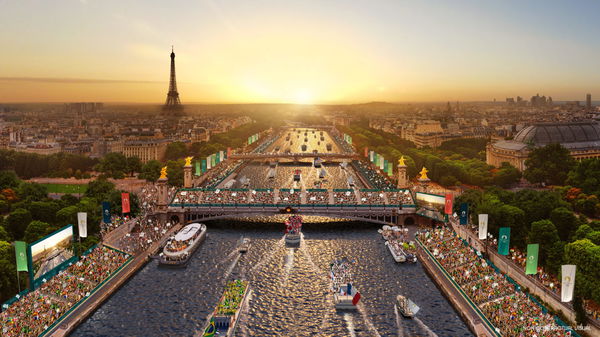
via Reuters
A visualisation of the 2024 Paris Olympic Games opening ceremony is pictured in this undated handout obtained December 13, 2021. Paris 2024/Florian Hulleu/Handout via REUTERS THIS IMAGE HAS BEEN SUPPLIED BY A THIRD PARTY NO RESALES. NO ARCHIVES

via Reuters
A visualisation of the 2024 Paris Olympic Games opening ceremony is pictured in this undated handout obtained December 13, 2021. Paris 2024/Florian Hulleu/Handout via REUTERS THIS IMAGE HAS BEEN SUPPLIED BY A THIRD PARTY NO RESALES. NO ARCHIVES
In just five months, the highly anticipated “Paris 2024” event is set to unfold. “Paris”- The host city is pulling out all the stops to ensure that this occasion is nothing short of spectacular. However, Parisians recently took to the polls to decide the fate of SUVs on the streets of the French capital. The referendum proposed by Socialist Mayor Anne Hidalgo aimed to address environmental concerns and make Paris more pedestrian and cyclist-friendly, particularly with the upcoming Olympic Games in mind.
The city holds its breath for the referendum results. The outcome may well dictate the future landscape of Parisian urban mobility. Will Parisians endorse these sustainable initiatives? Will they pave the way for a future marked by eco-friendly urban mobility?
ADVERTISEMENT
Article continues below this ad
Mayor Hidalgo’s bold moratorium
Central to Mayor Hidalgo’s plan is a significant increase in parking fees for SUVs. This is especially targeted at those owned by individuals residing outside the city limits. The proposal focuses on the financial aspect of SUV ownership. Fees are set to triple for non-residents. Hidalgo contends that SUVs consume excessive space on Parisian streets. They contribute disproportionately to pollution and pose risks to public health. By making SUV parking substantially more expensive, the hope is to incentivize a shift towards smaller, eco-friendly vehicles. The goal is also to reclaim Parisian streets for pedestrians and cyclists.

The proposed parking fee structure is designed to be progressively punitive, especially in the central districts. Non-resident SUV owners would face a steep initial fee of 18 euros ($19.5) per hour for the first two hours, compared to the 6 euros per hour for smaller cars. Longer stays would incur even higher costs, with a six-hour SUV parking session amounting to 225 euros ($243). This is significantly more than the 75 euros for smaller vehicles. This tiered approach seeks to address the SUV issue comprehensively. It aims to encourage a shift in consumer choices toward more sustainable and compact vehicles. But what prompted the decision to take this step?
ADVERTISEMENT
Article continues below this ad
Preparations and challenges leading up to Paris 2024
A few days ago, conflicting messages from organizers and French authorities raised concerns about the city’s readiness for the Paris 2024 Olympics. Despite French President Emmanuel Macron mentioning contingency plans for the opening ceremony, Lambis Konstantinidis, Paris 2024’s director of planning and coordination, assured that preparations were progressing as planned.
ADVERTISEMENT
Article continues below this ad
Construction for the Games was largely on time and under budget, with 84 percent of the work completed by December. Concerns loomed over Paris’s transport infrastructure. Mayor Anne Hidalgo had warned about the unpreparedness of the metro and rail networks to handle the anticipated 15 million spectators. However, it appears that this issue has been resolved. With navigation apps and whatnot, the fate of the Olympics lies on tenterhooks.
WATCH THIS STORY: University of New Orleans Blesses Track and Field World With a Massive $19 Million Update
ADVERTISEMENT
ADVERTISEMENT
ADVERTISEMENT
ADVERTISEMENT
